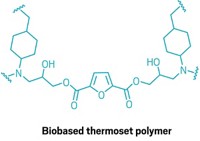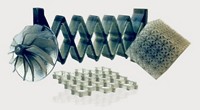Advertisement
Grab your lab coat. Let's get started
Welcome!
Welcome!
Create an account below to get 6 C&EN articles per month, receive newsletters and more - all free.
It seems this is your first time logging in online. Please enter the following information to continue.
As an ACS member you automatically get access to this site. All we need is few more details to create your reading experience.
Not you? Sign in with a different account.
Not you? Sign in with a different account.
ERROR 1
ERROR 1
ERROR 2
ERROR 2
ERROR 2
ERROR 2
ERROR 2
Password and Confirm password must match.
If you have an ACS member number, please enter it here so we can link this account to your membership. (optional)
ERROR 2
ACS values your privacy. By submitting your information, you are gaining access to C&EN and subscribing to our weekly newsletter. We use the information you provide to make your reading experience better, and we will never sell your data to third party members.
Materials
Vitrimers get new chemical switcheroo
Chemists capitalize on dioxaboralane metathesis to make malleable material more amenable to polymer processing
by Bethany Halford
April 10, 2017
| A version of this story appeared in
Volume 95, Issue 15
Six years ago, Ludwik Leibler and colleagues developed a new type of plastic with some impressive properties: It was tough like a thermoset polymer, such as Bakelite, but malleable like glass in that it could be melted and its shape reset. Leibler, of France’s National Center for Scientific Research, called the new material a vitrimer. The key to the vitrimer’s malleability was its chemistry. It consisted of ester cross-links that could break and reconnect with new partners when heated. Looking to apply this concept to polymers more commonly in use, Leibler, Renaud Nicolaÿ of the City of Paris Industrial Physics & Chemistry Higher Educational Institution, and colleagues have now switched out the ester cross-links for dioxaboralane cross-links (shown). These functional groups can be incorporated into commonly used polymers, such as poly(methyl methacrylate), polystyrene, and high-density polyethylene. When heated to 60 °C, the dioxaboralanes undergo metathesis—that is, they swap binding partners. The new vitrimers are also amenable to commercial processing methods, Leibler told attendees at the ACS meeting. The vitrimers could be processed, ground, and reprocessed several times via extrusion, compression molding, or injection molding, just like commercial thermoplastics. The research was also reported in Science (2017, DOI: 10.1126/science.aah5281).





Join the conversation
Contact the reporter
Submit a Letter to the Editor for publication
Engage with us on Twitter